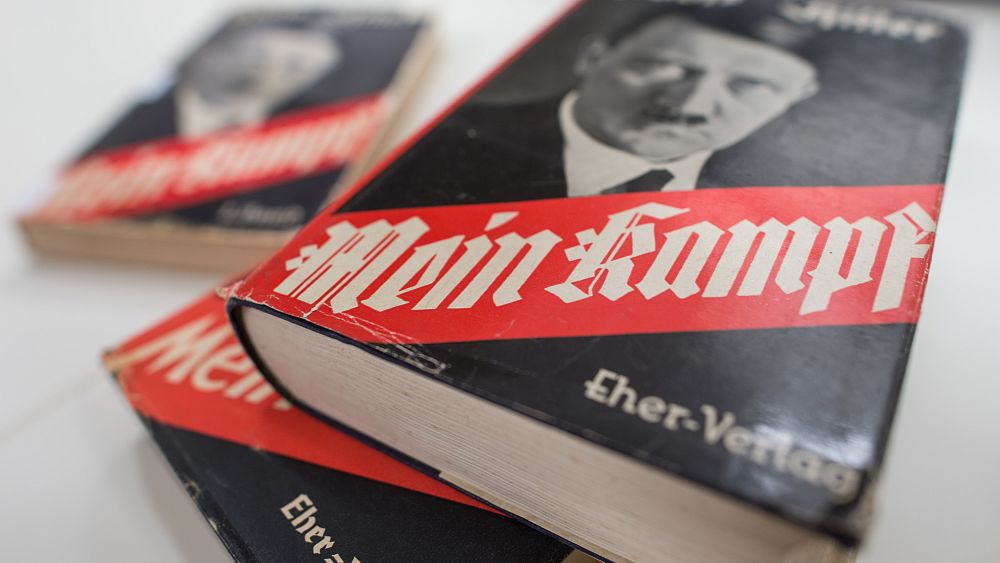
On this day in 1925, Adolf Hitler published his autobiographical manifesto ‘Mein Kampf’ in Germany.
Hitler started writing the time while imprisoned in 1924 following a failed coup in Munich the year earlier. Sentenced to five years for high treason, he actually only served a little over eight months before being released early for good behaviour.
Nevertheless, he spent much of his time behind bars writing ‘Mein Kampf’ and while it suffered from slow initial sales, it became a bestseller in Germany after he was appointed Chancellor in 1933.
Hitler originally wanted to call the book ‘Viereinhalb Jahre (des Kampfes) gegen Lüge, Dummheit und Feigheit’ – or ‘(Four and a Half Years [of Struggle] Against Lies, Stupidity and Cowardice)’ but his publisher convinced him to significantly shorten the title.
In the volume, his main focus was on the so-called ‘Jewish peril’, which is an opinion held by those who believe the Jewish people are behind a conspiracy to gain world leadership.
Hitler writes of the process by which he became increasingly anti-Semitic and militaristic, explaining that he had never met a Jew until he arrived in Vienna to study fine art in 1907.
The tyrant claims he was tolerant towards the Jewish people, dismissing anti-Semitic writings he came across as unworthy of serious consideration.
Germany’s national reconstruction
Hitler poured scorn on communism and the Weimar Republic and accused Social Democrats and Marxists as well as Germany’s old parliament of nefariously collaborating with Jewish leaders. He called for the destruction of the entire parliamentary system, suggesting those who reach power are “inherent opportunists”.
The Führer also wrote about his distaste at seeing a melting pot of a society like that he found in Vienna.
“Czechs, Poles, Hungarians, Ruthenians [Ukrainians], Serbs and Croats, and always that infection which dissolves human society, the Jew, were all here and there and everywhere”, he wrote of his reaction to the experience.
Through the two volumes of ‘Mein Kampf’ – the second published in 1926 – Hitler made an enormous amount of money – what would now be approximately €5.5 million. By 1933, he had sold around 240,000 copies of the book. His tax debt of roughly €1.4 million was waived after he became Chancellor that year.
Post-war legacy
Originally, more than 12 million copies of the manifesto were published, but were burned after the war.
On Hitler’s death by suicide in 1945 at the end of the Second World War, copyright of ‘Mein Kampf’ passed to the state government of Bavaria. They refused any copying, printing or republishing of the book in any German territory.
In 2016, though, the copyright expired and the tome was made available in Germany for the first time since 1945.
There was much debate and divided reactions from Jewish groups, the public and academics. As a result, a team of scholars from Munich’s Institute of Contemporary History published a two-volume edition in the German language, annotated with about 3,500 notes.
Perhaps surprisingly, over 85,000 copies have been sold since the reprint – and the book spent 35 weeks on Der Spiegel’s non-fiction best-seller list.
Hundreds of thousands of original copies of ‘Mein Kampf’ still survive, but German leaders have long since vowed that any republication or distribution of the original work without proper annotation remains a serious crime.
In 2021, a French version was released. Based on the German annotated version, it features about twice as much commentary as text.
Although the original text was translated into at least 16 languages – including Arabic, Persian and Turkish – there have yet to be any translations of the new, annotated version outside France and Germany.
THE ROTTEN FISH: CAN OF WORMS OPENED OF APC & TINUBU'S GOVERNMENT OVER NIGERIA'S ECONOMIC DOWNTURN
WATCH THE CRITICAL ANALYSIS AND KNOW THE RESPONSIBLE PARTIES TO BLAME FOR NIGERIA'S ECONOMIC CHALLENGES, WHILE CITIZENS ENDURE SEVERE HARDSHIPS.Watch this episode of ISSUES IN THE NEWS on 9News Nigeria featuring Peter Obi's Special Adviser, Dr Katch Ononuju, 9News Nigeria Publisher, Obinna Ejianya and Tinubu Support Group Leader, McHezekiah Eherechi
The economic crisis and hardship in Nigeria are parts of the discussion.
Watch, leave your comments, and share to create more awareness on this issue.
#9NewsNigeria #Nigeria #issuesInTheNews #politics #tinubu THE ROTTEN FISH: CAN OF WORMS OPENED ...
DON'T FORGET TO SUBSCRIBE AND LEAVE YOUR COMMENTS FOR SUBSEQUENT UPDATES
#9newsnigeria #economia #economy #nigeria #government @9newsng
www.9newsng.com
